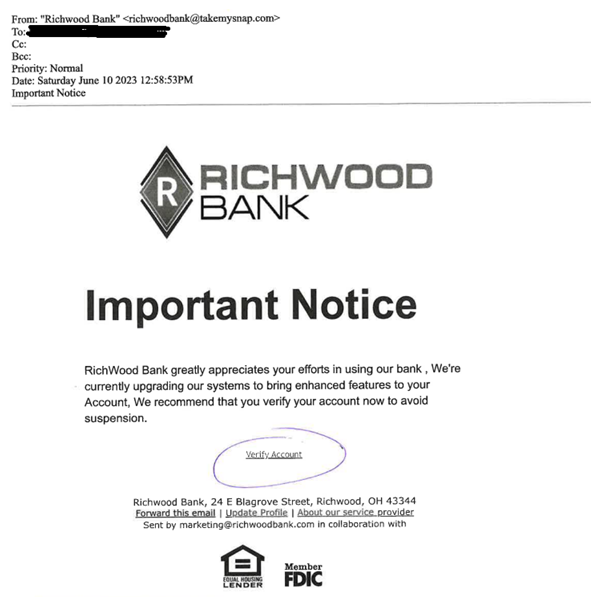Most successful scams include similar tactics and one favorite of criminals is creating a sense of urgency. They will use language like “Important Notice” or “Account Suspension” to get you to act before you have a chance to think it through. We received a recent example that has many of the red flags consumers should be on the look-out for before clicking on links or opening attachments.
The first is the ‘From’ address – in this case <richwoodbank@takemysnap.com>. The last part of an address is known as the domain and is a great indicator of whether the sender is truly associated with the business. Any messages from Richwood would come from [name]@richwoodbank.com or one of our affiliates like @richwoodfinancial or @richwoodmarketing.
The next indication that this may be a scam is the big Important Notice heading. Again – scammers love to create a sense of urgency that overrides our common sense. Be wary of any communications that leads with this type of phrase.
Immediately after the scary headline is the first grammatical error – another common hallmark of scams. Note that Richwood is now RichWood and there are commas instead of periods between sentences. Spelling and punctuation count, especially in messages that claim to be from legitimate businesses. However, there are plenty more sophisticated scams that don’t contain grammar issues and are very convincing.
If you see one or more of these red flags or just don’t want to risk clicking on a link in an email, call us directly. If the message is legitimate and we need you to complete an action, we’ll let you know. These rules apply to any business you work with – not just your bank. If your utility company, insurance agent, or anyone else emails you something like this and you’re not expecting it – give them a call to verify what action you need to take. Be sure you use the phone number listed on your statements or their website.


